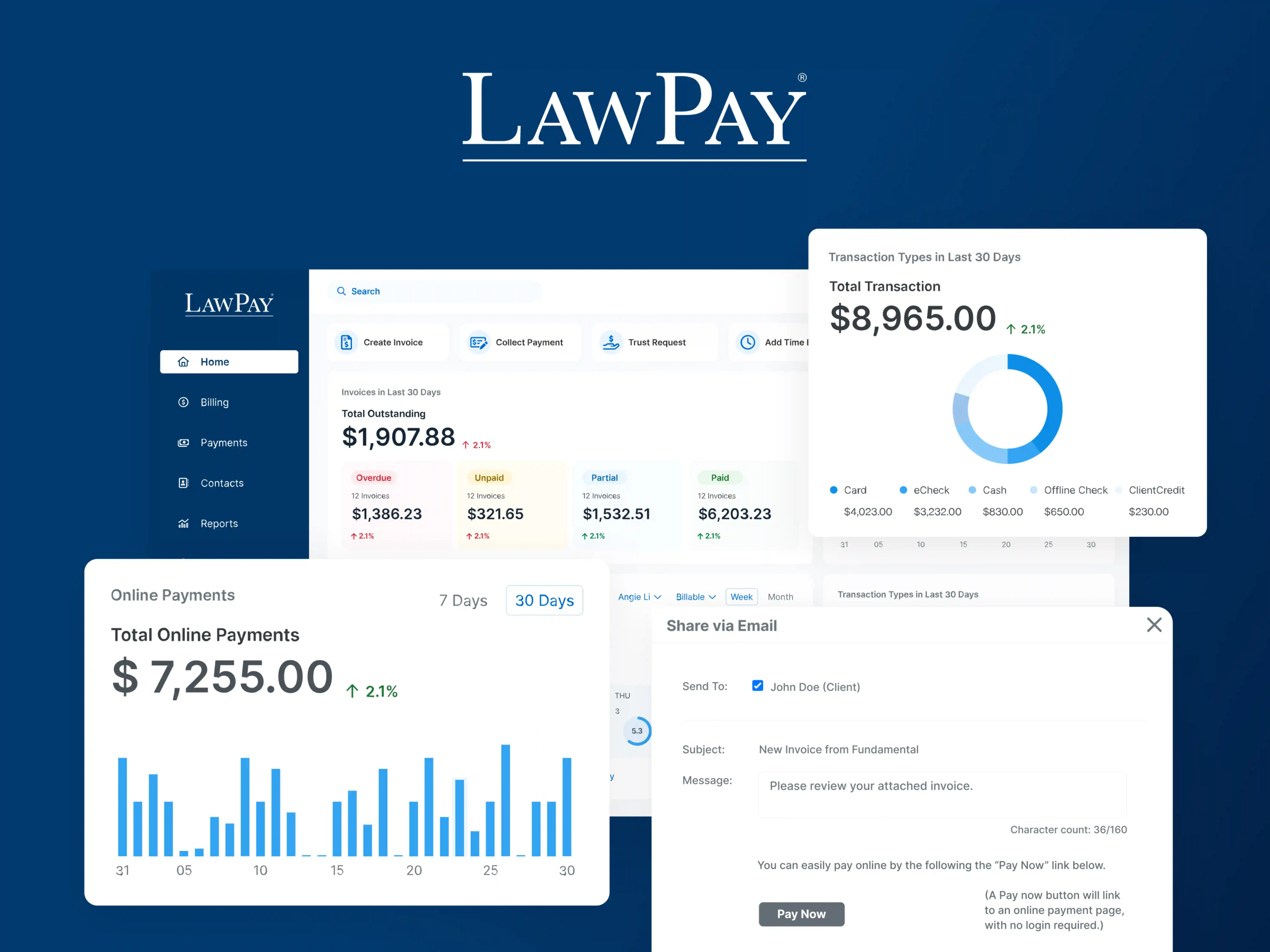Get paid faster and with less hassle. That's the headlining benefit for accepting credit card payments at your law firm. To access that benefit, you need a credit card processing service that's tailored for lawyers—one that keeps you compliant as it improves your cash flow.
This guide covers the basics of law firm credit card processing, including:
Why you need an industry-specific processing solution
What you should consider when choosing a payments partner
How to choose the right processing service for your firm
Schedule a demo to see what LawPay can offer your firm.
Book Now
What is Law Firm Credit Card Processing?
Law firm payment processing services authorize and settle client credit card payments in compliance with state bar associations.
Today's client expects the option to fund retainers and expenses with a credit card. Two popular questions people ask are: Can you put a lawyer retainer on a credit card? And, can you pay lawyers' fees on a credit card? The firm that answers yes to both questions has a marketing and customer service advantage.
In some cases, funding legal fees is a necessity for the client. A 2021 Bankrate survey reports that 25% of Americans have no cash savings for emergencies, including unexpected legal issues. Even for those who do have the liquidity, credit card payments are more convenient and faster than writing a check and driving it into your office.
While many clients prefer using their credit card, they also have no insight into the complexities or ethical questions surrounding credit card payments to law firms. For that reason, an effective law firm credit card processing solution must handle those complexities in the background—without any friction for the client.
At a minimum, bar-compliant law firm credit card processors must keep unearned trust deposits whole, without charging processing fees against them. This is not how standard credit card processors work. In other industries, the processor pulls its fee directly from the funds being paid. A law firm card processor, however, should collect its fee separately from the firm's operating account.
Why is Choosing the Right Credit Card Processing Service for Lawyers Important?
The right credit card processing service for lawyers protects your firm from ethics violations arising from charges against unearned trust deposits, data breaches, and penalties for not complying with recognized data safety standards.
Most states require you to hold retainers in a trust account. Until you earn those funds, the money still belongs to your client. Consuming those funds for any purpose before they are earned is generally an ethics violation. The violation stands whether you personally spend the money or your credit card processor charges fees against those trust deposits.
When you accept payments via credit card, you also accept the responsibility of keeping customer credit card information safe. The standard card data safety protocol is payment card industry (PCI) compliance.
Card processors are PCI compliant, but you can't rely on your card processor's compliance as your own. Your firm likely integrates other systems with customer payments, which means you must separately achieve PCI compliance for your firm.
Payment brands Mastercard, Visa, and American Express can impose penalties on your firm for not complying with PCI standards. Additionally, failing to adequately protect client data may result in discipline from your state bar association.
In short, your choice in card processors makes a difference. The right card processor will help your firm reach compliance—at no extra charge.
What to Consider for Law Firm Credit Card Processing
Bar compliance and PCI compliance support are primary considerations when choosing a payments service. But there are other factors, too.
The right law firm payment processing solution should do five things:
[html: <ul style="list-style:none;"> <li> 1. Integrate seamlessly with your accounting and law practice management systems </li> <li> 2. Have an understandable and affordable fee structure </li> <li> 3. Allow for multiple payment types </li> <li> 4. Provide extensive reporting </li> <li> 5. Have responsive customer service </li> </ul>]
Let’s review each element below.
1. Integrations
A standalone payment processing solution will not feed data into your existing systems. You'd have to manually input and reconcile all card payments, wasting time on duplicate entry and increasing the odds of human error.
Out-of-the-box integrations, on the other hand, save time and keep your records clean.
Look for a payments solution that fully integrates with your accounting, billing, and practice management software. Know that there are levels of integration—so it's best not to make any assumptions in this area. As you review prospective payments solutions, verify which data points move, and in which direction, between your systems.
Know, too, that customizations on your end can affect the flow of data between systems. You may not realize the conflicts until you've chosen the provider and begun the setup. For this reason, you should find out early what level of integration support the card processor provides. At a minimum, you may need help troubleshooting.
Updating your systems as needed will be your responsibility, but solid integration support from your card processor can streamline that process.
2. Processing Fees
The fees from your payment partner must be transparent and affordable. Generally, you can expect a monthly subscription fee and transaction-level charges. Some providers have a lower subscription fee with higher transaction charges. Others do the opposite—a higher subscription fee with lower transaction charges.
Monthly subscription fees should be straightforward, but transaction fees aren’t. These fees come from several entities, including the issuer, the banks involved, and the card association such as Visa or Mastercard. Also, transaction fees are inconsistent. They can vary by card type and card issuer. Even two cards from the same issuer can incur different transaction fees.
For those reasons, projecting transaction fees precisely will be challenging.
Still, you should know what fees you'll be charged and when—at least well enough to budget for them. Ask prospective payment providers to explain the fee structure in detail, including the timing of those transaction charges. Some providers charge them to your firm's operating account as they happen, while others aggregate the transaction fees and charge them monthly.
3. Payment Type Options
All attorney credit card processing providers should accept the traditional payment types: debit cards, credit cards (Visa, Mastercard, American Express, Discover), plus eChecks. The standard today is to process these payments online. Depending on the provider, you may or may not have the option to also swipe a card physically in a point-of-sale terminal.
Also, the electronic payments space is rapidly evolving. As such, credit card processing for lawyers should evolve into new features and alternative payment methods. Look for forward-thinking partners that continue to roll out features to streamline billing and collections for you and your clients.
4. Reporting
Detailed reporting shows what you've collected and when you'll have access to those funds. It also documents your fees, which allows you to refine your budget. Lastly, good reporting immediately notifies you of problems, such as client chargebacks or failed payments.
But reporting is only as useful as it is understandable. A convoluted transaction history report does not expose payment inefficiencies or help project your monthly cash flows. This can easily be the area where your payment provider falls short of expectations.
Ask to see the standard reports for any prospective credit card processors. If possible, review them independently first. They’ll be a good indicator of how intuitive the data is. Then, if necessary, request a walk-through.
5. Customer Service
The right payments partner for your law firm will have a responsive, knowledgeable customer service team.
Customer service is a challenging area to vet before you select a partner. After all, any provider will tell you they offer top-notch customer support. Rather than question prospective providers on the quality of their customer care team, ask for the facts:
When can customers reach your support team?
What is your average issue resolution time?
What level of support is free and when do customers incur charges?
Will I have a single point of contact?
Is there an online knowledge base or other self-service support materials?
In aggregate, these details help you understand how easy it might be (or not) to get answers from your provider when you need them.
How Do You Choose the Right Credit Card Processing Service for Your Law Firm?
Knowing the primary considerations when choosing an attorney credit card processing provider is one thing. It's another to evaluate those considerations and narrow your options down to a single best provider. Use the process outlined below to stay organized and on track.
1. Know Your Priorities
Before you schedule demos or interviews, establish the priorities for your firm. If you have office staff, gather feedback from every employee who will be involved in payment processing. Attorney office concerns to note include the following.
What systems and software need to send or receive payments-related data? LawPay, for example, integrates with more than 60 legal software products.
What payment types and features do you need? LawPay supports in-person payments and online payments. LawPay also has Pay Later, a legal fee lending solution.
What is your state's position on credit card payments to lawyers? At a minimum, you need your card processor to pull card fees from your firm's operating account, while directing payments into trust accounts. Your state may have other requirements as well. LawPay's technology is vetted and recommended by all 50 state bars, 60+ local and specialty bars, and the American Bar Association.
2. Ask Detailed Questions
Don't rely on marketing materials to verify features. They're often not specific enough. Ask detailed questions about every priority on your list. This is especially important with respect to integrations.
Keep a file of notes on each prospective provider. The more organized you are, the easier it will be to compare your options later.
3. Schedule Demos
Demos show you and your staff how intuitive these systems and their reporting dashboards are.
As noted above, it's critical to review the reporting carefully. This data should establish the business value of accepting credit card payments by way of faster, less labor-intensive collections. But that only happens when you can understand your reporting.
4. Check With Colleagues
Your colleagues may have valuable experiences to share about their credit card payment providers. Ask about the setup process, ease of use, and customer support. Or, look for feedback on providers in online reviews.
For instance, LawPay is an established leader in credit card processing for lawyers. We have a Trustpilot score of 4.8 out of 5. We also rank above the industry averages in ease of setup, ease of use, and customer support.
The Best Credit Card Processing Solution for Lawyers
Schedule a demo to see what LawPay can offer your firm.
Book Now
When it comes to credit card payment processing, attorney requirements are unique. Yes, you want a card processing solution that gets you paid faster and easier. But the best solution also keeps your law firm compliant with your state's bar and PCI standards, while integrating seamlessly with your workflows. You also need solid reporting and readily available customer support for ultimate success.
Fortunately, LawPay ticks all the boxes for attorneys across a variety of practice areas and firm sizes. Find out for yourself—schedule a demo today.
About the author

Catherine BrockContent Writer
Catherine Brock is a Content Writer for leading legal software companies, including MyCase, Docketwise, CPACharge, CASEpeer, and LawPay—the #1 legal payment processor. She covers emerging legal technology, financial wellness for law firms, the latest industry trends, and more.
